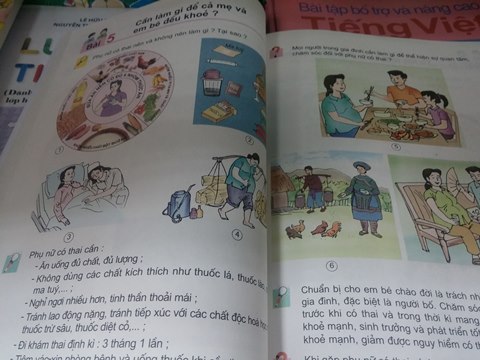

A young mother complained on a social network recently that she did not know how to help her 10-year old daughter with a lesson on a woman’s pregnancy.
“What to do to keep both mother and baby healthy?” is the title of a lesson the daughter, a fifth grader, has at school.
The lesson shows what a pregnant woman should do to protect herself and the baby: 1) have a balanced diet 2) avoid use of stimulants such as tobacco, alcohol and drugs 3) keep away from heavy labor and avoid exposure to toxic chemicals such as pesticides and herbicides 4) have regular check-ups once every three months, and 5) have vaccinations as directed by physicians.
The mother complained that as her daughter did not understand the lesson, she could not commit the knowledge to memory. The girl feared that she might get bad marks because of this.
“She struggled with the lesson a whole day yesterday, but she still cannot remember it,” the mother wrote on her Facebook,
Many other parents say the sex education lessons are not very good.
“Such academic knowledge should be compiled for adults to read instead of fifth graders,” Vu Viet Hung, a parent, commented.
“I totally agree with educators that it is necessary to provide knowledge about reproductive health to general school students. However, the lessons should be designed in a way to make it simple to understand for students,” Lan Anh, a housewife, noted.
“The authors of the textbook were too careless when designing the lesson. I think they simply made the ‘copy and paste” when compiling the textbook,” she added.
Bui Phuong Nga, the chief author of the textbook, said the lessons related to sex education had always raised controversy.
“Some parents say it is too early to begin giving sex education to primary school students. Meanwhile, others believe that sex education should begin sooner,” Nga said.
As an educator, Nga believes that it is reasonable to start sex education to fifth graders.
Nga and her colleagues, who conducted a major survey in 1995-1997, discovered a considerable percentage of girls suffering from sexual abuse and early sexual maternity.
Therefore, they came to the conclusion that students should be provided with reproductive health services as soon as possible.
Nga believes that the textbook content is not too academic or vague, saying that Japanese experts had praised the textbook compilation.
She also said the lesson had been put in the curriculum only after it was taught in a pilot program and students showed their interest in the lesson.






- Hanoi launches pilot project to integrate electronic health records into VNeID app
- Empowering new generation of biodiversity champions in Vietnam
- Capital Law to make Hanoi major center for quality education
- Hanoi raises road safety awareness among students
- Hanoi pilots artificial intelligence in five schools
- Modern pediatric hospital opens in Hanoi
